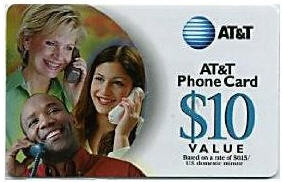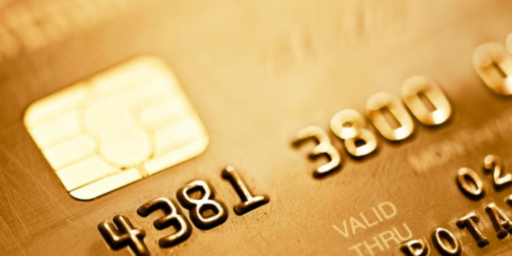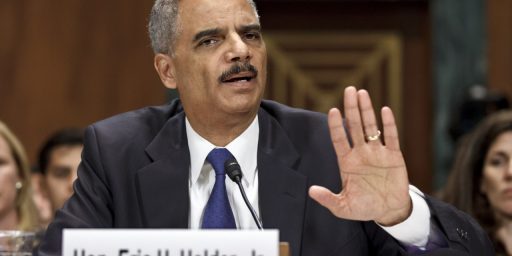DC Sues AT&T for Unused Customer Minutes
 In a rather bizarre case, the District of Columbia is suing AT&T for the value of unused money on calling cards owned by someone else.
In a rather bizarre case, the District of Columbia is suing AT&T for the value of unused money on calling cards owned by someone else.
The attorney general for Washington D.C. has filed a lawsuit against an AT&T Inc (T.N) unit, seeking to recover consumers’ unused balances on prepaid calling cards. The suit claims that AT&T should turn over unused balances on the calling cards of consumers whose last known address was in Washington, D.C. and have not used the calling card for three years.
“AT&T’s prepaid calling cards must be treated as unclaimed property under district law,” the attorney general’s office said in a statement. According to the attorney general’s office, that sum, known in the industry as “breakage,” represents some 5 to 20 percent of the total balances purchased by consumers who use the calling cards.
States and municipalities have often similarly used unclaimed property laws, known as escheat laws, to claim ownership of unused retail gift card balances.
I don’t know the status of these other suits, but agree with Radley Balko that the idea is laughable. He quips, “Next up, D.C. sues Burger King for stray fries that go uneaten after falling to the bottom of the drive-thru bag.” Indeed.
Escheat makes some sense in the case of physical property that is ownerless or unclaimed. For example, property owned by someone who dies without a will or survivors escheats to the state. Ditto, say, tax refunds that are unclaimed after a certain period of time. Something has to happen to that property, after all, and the government — representing the community — is the natural beneficiary of last resort.
In the case of calling cards or gift cards, however, we have a contract between a firm and an individual: A $50 gift card allows the holder to buy $50 of goods or services from the firm within a specified period of time. The failure of the holder to cash in the cards does not — or, at least, should not — create cash value that defaults to the state. Lots of transactions with theoretical value go uncompleted and the beneficiary is the other party.
If, for example, I promise to buy someone a beer the next time they’re in town but they don’t come back to collect the beer, do I owe the mayor a beer? Or, using the example here, the retail value of said beer? Do I have to leave him a tip, too?





Why is this any different than unclaimed cash in a bank account? I have given company X $10, in the bank case, they have agreed to give me the $10 back, in the phone company case, they have agreed to give me $10 in services, however, in both cases if I never ask for my $10 back or never use $10 in services, the company has received $10 in exchange for nothing, why should there be any difference in the phone company case?
And I enjoy Radley Balko but that’s just silly.
The difference is that there is actually $10 sitting there that has to belong to someone. But with the phone card, that isn’t the case. You paid $10 for a card that allows you a certain amount of minutes of phone usage. The $10 is non-refundable and belongs to the phone company. The phone minutes are not a tangle handful of money that has to be discharged somewhere. It can just go away, by hitting a delete button on a computer.
I agree with Ben. And don’t these cards have written on them that they have no cash value, they’re non-transferable, and if they are they’re worth 1/100th of a cent? In short, the card distributor is in the business of selling a commodity, not holding cash for people.
Also, keep in mind that escheat has nothing to do with fairness or incentives. It is a common-law doctrine that deals only with the idea that physical property (and money) cannot be ownerless. It has to have a physical owner. Phone card minutes are not the same.
It seems to me that it would be more profitable for DC to go after the un-used gym memberships that will accrue all over the city in the next couple of months.
My first thought was that the gov’t could use escheat here, but that they may have to take it in kind (e.g. in long distance calling card minutes DC could use). But your beer example gave me pause. Assuming that after three years the original owner can not expect to use the minutes (which wouldn’t please me as the original owner), then either the government should be able to escheat the goods in kind (e.g. calling card minutes) or the company should declare them as profit and the gov’t gets their share out of taxes. The second makes the most sense to me.
Most of the states have modified their escheat laws to deal with this issue. Table Here I’m not going to read through fifty plus summaries, but I had always throught escheat was being used as a tool against gift cards with early expiration dates. I could be wrong. Anyway, the summary of the D.C. provisions makes me wonder about the three year term in story:
What’s odd to me is that I purchase prepaid cell phones and cards with extra minutes because (a) I don’t want a cell phone contract, and (b) I want emergency access to a phone when I travel a long distance. So I probably have a couple cards in my glove compartment that are going unused, but I did actually use them as security against an emergency that didn’t happen.
You have to admit that this is a brilliant idea by DC. Why stop with just gift and phone cards…lets extend this to every resource that is potentially underconsumned. How much potential electricity is available to flow into DC’s powerlines – lets quantify that and tax it. How many people in DC are evading their gasoline taxes by not driving? Lets tax that as well. Even better – why can’t DC collect sales taxes at the MSRP instead of the actual sales price. Think of the millions of dollars of potential revenue wasted every year because of the black Friday sales. What about oxygen…..
I think the problem for D.C. here is that a property right is defined by contract, and in this case (as others point out), the contract says that the right to receive the service expires, so at that point there is no property to escheat. It’s similar to the bank account example: Unclaimed balances eventually escheat, but banks can effectively confiscate small accounts by imposing monthly fees. That’s all AT&T is doing here.